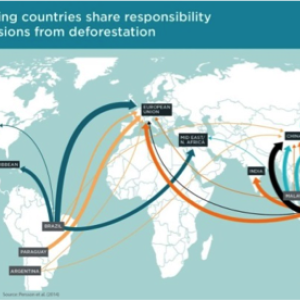
In this report commissioned by Center for Global Development, researchers at Chalmers University, Linköping University and Vienna University describe how international trade with agricultural and wood products is an increasingly important driver of tropical deforestation. More than a third of recent deforestation can be tied to production of beef, soy, palm oil and timber.
The trend is clear, the drivers of deforestation have been globalized and commercialized," says assistant professor Martin Persson, Chalmers University of Technology in an article on Science Daily.
Photo credit: Center for Global Development
Abstract
This paper aims to improve our understanding of how and where global supply-chains link consumers of agricultural and forest commodities across the world to forest destruction in tropical countries. A better understanding of these linkages can help inform and support the design of demand-side interventions to reduce tropical deforestation. To that end, we map the link between deforestation for four commodities (beef, soybeans, palm oil, and wood products) in eight case countries (Argentina, Bolivia, Brazil, Paraguay, Democratic Republic of the Congo, Indonesia, Malaysia, and Papua New Guinea) to consumption, through international trade. Although few, the studied countries comprise a large share of the internationally traded volumes of the analyzed commodities: 83% of beef and 99% of soybean exports from Latin America, 97% of global palm oil exports, and roughly half of (official) tropical wood products trade. The analysis covers the period 2000-2009. We find that roughly a third of recent tropical deforestation and associated carbon emissions (3.9 Mha and 1.7 GtCO2) can be attributed to our four case commodities in our eight case countries. On average a third of analyzed deforestation was embodied in agricultural exports, mainly to the EU and China. However, in all countries but Bolivia and Brazil, export markets are dominant drivers of forest clearing for our case commodities. If one excludes Brazilian beef on average 57% of deforestation attributed to our case commodities was embodied in exports. The share of emissions that was embodied in exported commodities increased between 2000 and 2009 for every country in our study except Bolivia and Malaysia.
Citation
Persson, M., Henders, S., Kastner , T., Trading Forests: Quantifying the Contribution of Global Commodity Markets to Emissions from Tropical Deforestation - Working Paper 384, Center for Global Development
Read the full report here and an article about the paper here.







Post a new comment »